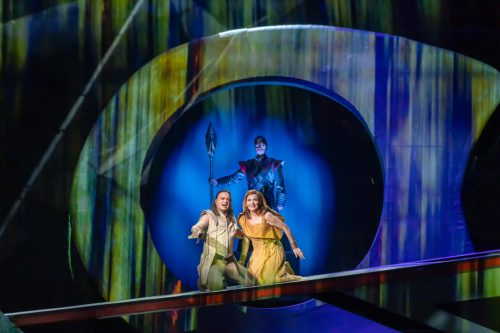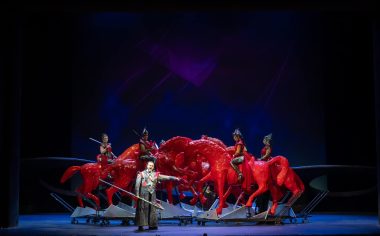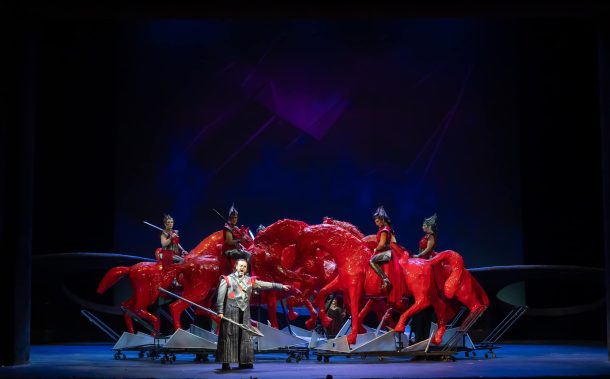 Bulgaria Wagner, Die Walküre: Soloists, Orchestra of Sofia Opera and Ballet / Evan-Alexis Christ (conductor). Sofia Opera, 16.6.2024. (GT)
Bulgaria Wagner, Die Walküre: Soloists, Orchestra of Sofia Opera and Ballet / Evan-Alexis Christ (conductor). Sofia Opera, 16.6.2024. (GT)

Die Walküre has the most exciting Prelude of any Wagner opera in immediately gripping the listener and preparing them for what is to come. At the heart of the drama are the intense dialogues between the central characters in which they are transformed from being strangers to becoming lovers, and on the other hand, between the male characters, there appear emotions of distrust and suspicion and end in death for some of them. Ultimately, redemption emerges as the greatest force in the stage work.
In the brief Prelude, the curtains revealed Siegmund pursued by Hunding’s men preparing us for what was to come. The sets changed to a great, triangular structure of Hunding’s dwelling, and beyond is a pathway and another great triskel. In the opening scene, when Sieglinde finds the stranger in her home, there is an extraordinarily beautiful solo passage on the cello, which is the tragic love motif from Das Rheingold and is a portent of the relationship between her and Siegmund. Her phrase ‘Dies Haus und dies Weib sind Hundings Eigen’ reflects on her sad fate in a loveless union. After giving Siegmund a drink, she unveils her longing for love and there will be further evidence of her burgeoning feelings for Siegmund. Tsvetana Bandalovska was outstanding in her portrayal of the lonely, loveless woman.
The portrayal of Hunding by the marvellously dark bass of Icelandic Bjarni Thor Kristinsson was outstanding whose every phrase revealed wickedness and threatening presence. This was especially as he notices the likeness of his wife and Siegmund. Sieglinde, as so often happens in Wagner’s operas, offers a potion to put her husband to sleep before he can cause harm. The glances exchanged between the two are wonderfully portrayed and beautifully accompanied by the woodwind, before the sword motif from Das Rheingold (review here) is heard from the trumpet, oboe and the cor anglais, leading to Siegmund reflecting on his father’s promise of his sword, ‘Ein Schwert verhiess mir der Vater’ and united with Sieglinde she shows him the sword and their declaring love is beautifully portrayed with superb orchestral playing to her singing, ‘Du bist der Lenz’ and by Siegmund’s ‘O susseste Wonne!’
A strength of the casting was in the Wotan of the Greek singer Aris Argiris and matched by the portrayal of Mariana Tsvetkova’s Fricka. Portraying the passion of Sieglinde and Siegmund, it was as if the singers had lived in these roles for years – so realistic were their characterisations. Kristinsson’s Hunding has a deep threatening bass and was fearsome in facial and bodily movements; the orchestra was excellent with several fine virtuoso solos from the woodwind, and especially by a solo cello accompanying Wotan. Conductor Evan-Alexis Christ’s tempos ensured a quick pace of the action and evincing increasingly dramatic accompaniment to the singing. In Act II, in the dialogue between father and daughter, Wotan revealed his superb voice, deep and clear, and the Brünnhilde of Gergana Rusekova was especially fine, every expression revealing emotive feeling from anger to tenderness. As he sang, there appeared visions of figures from the past in one of the great uplifted triskels in the background, a particularly effective device by Plamen Kartaloff in this revival.

As it was in last year’s performance, the most exciting scene was at the opening of Act III with the entry of the eight Valkyries on their red horses, and if anything, their movement on stage was better choreographed than before – especially in their protecting Brünnhilde and Sieglinde from the wrath of Wotan.
Most of all, it Rusekova’s Brünnhilde who provided one of the most outstanding vocal and acting performances of the evening; her interpretation and characterisation of Brünnhilde has developed marvellously since last year and she has the beautifully seamless voice for this part. Her costume also enhanced her performance with a dark scarlet and light grey dress – she was Brünnhilde and hers was one of the great performances over the entire cycle.
Rusekova was matched by the Wotan of Argiris, whose stage presence and singing were highlights. Argiris was magisterial in his great moments, especially in the ‘Leb’ wohl’ in Act III as he gives his farewell to his daughter Brünnhilde. Argiris gave a spectacular vocal and acting performance. Kristinsson’s Hunding was terrific throughout, and I cannot remember a more convincing portrayal of this wicked and tyrannical figure; in every phrase there was threat, and the killing of Siegmund was realistic in its brutality.
Another outstanding performance was Tsvetana Bandalovska’s Sieglinde, and this year, even more so than last year, she gave a complete realisation of the maligned wife; her face revealing her fear and suspicion, of discovery and love, her reaction to the terrible murder of her brother and lover Siegmund, and finally her radiant singing of ‘O hehrstes Wunder!’ in Act III. Martin Iliev again was a great Siegmund, marvellously portraying the desperate refugee from Hunding’s warriors. He has a beautiful tenor suitable for heldentenor roles, even if not of the highest range, he is still a magnificent singer.
Mariana Zvetkova, as Fricka, gave a masterly portrayal in her chastising of Wotan, and her singing was matched by nuanced movements and her ever-so-delicate eye expression. The orchestra were once again superb, with great solo passages at crucial moments, and Evan-Alexis Christ produced an outstanding performance from them and managed to present a slightly different Wagnerian sound than that heard last year under Constantin Trinks – it was more exciting and intense, particularly in the great scenes on the stage. The costumes by Hristiyana Mihaleva-Zorbalieva were magnificent and the tailoring combined with their colour schemes suiting the different characters and their stories, whilst the lighting by Andrej Hajdinjak and the multimedia by Ivan Lipchev and Elena Shopova were an added dimension making this performance often sensational in its extraordinary dramatic narrative.
In all, this was a terrific staging and once again demonstrated the outstanding talents of this company; almost all the principal soloists were Bulgarian; most notably Rusekova’s Brünnhilde and Bandalovska’s Sieglinde, Zvetkova’s Fricka and Iliev’s Siegmund. This production has been seen in Bavaria, South Korea, and in North Macedonia, all to great acclaim. Hopefully, it will travel widely across Europe in coming seasons, in many aspects it is revelatory.
Gregor Tassie
Production:
Direction – Plamen Kartaloff
Assistant Director – Yulia Krasteva
Set designer – Hans Kudlich
Costumes – Hristiyana Mihalev-Zorbalieva
Lighting design – Andrej Hajdinjak
Multimedia – Ivan Lipchev, Elena Shopova
Constructive development – Georgi Georgiev
Design and Structure – Boryan Belchev
Artist – Christiyan Stoyanov
Cast :
Wotan – Aris Argiris
Fricka – Mariana Zvetkova
Siegmund – Martin Iliev
Hunding – Bjarni Thor Kristinsson
Brünnhilde – Gergana Rusekova
Sieglinde – Tsvetana Bandalovska
Helmwige – Stanislava Momekova
Ortlinde – Silvia Teneva
Gerhilde – Lyubov Metodieva
Waltraute – Ina Petrova
Siegrune – Elena Mehandzhiyska
Rossweisse – Tveta Sarambelieva
Gringerde – Alexandrina Stoyanova-Andreeva
Schwertleite – Vesela Yaneva
